Enlightening Uniqueness

The time is a strange piece. It is unrepeatable, relentless, mysterious yet so present.
3
01. The Brand
02. Brand Values
02.1 Mastery. Only in Murano
02.2 Heritage. The secrets that made us
02.3 Passion. Heart and alchemy
02.4 Excellence. The path to nobility
03. Through Time
03.1 Renaissance men 03.2 Centuries and Masterpieces 03.3 New Life 03.4 Here, now and tomorrow 03.5 The Light of Time
04. Icon - Taif 04.1 The essential made visible

01. Il Brand
02. I Valori del Brand
02.1 Maestria. Solo a Murano 02.2 Heritage. Le opere, i segreti 02.3 Passione. Cuore e alchimia 02.4 Eccellenza. Il percorso verso la nobiltà
03. Attraverso il tempo
03.1 Figli del Rinascimento 03.2 Capolavori nei secoli 03.3 La Rinascita 03.4 Oggi e domani 03.5 La Luce del Tempo
04. L’icona - Taif
04.1 L’essenziale, visibile agli occhi
3
The Brand IL BRAND
5 4
Sometimes, at our furnace in Murano, we pause and think about time.
The time we put into our work. The time it took us to get where we are. The time that shaped the lagoon around us. Ultimately, the time that passed between now and the 1295, when the first member of the Barovier family, Jacobello, began to work glass.
Il tempo è uno strano processo. Inesorabile, inafferrabile, eppure così presente. È il tempo che dedichiamo al nostro lavoro. è il tempo che c’è voluto per arrivare fin qui, dal 1295, da quando
il primo membro della famiglia Barovier, Jacobello, ha iniziato a lavorare il vetro. È anche il tempo che ha plasmato la laguna che si vede dalla nostra fornace, a Murano.
7 6
More than seven Centuries taught us a lot, especially one thing: the best way to keep a tradition alive is to actually live it. Art is practice, and locking away an ancient craft for fear of losing it is a risk nobody can afford. You have to make art. In between the sweating and stretching of the glassworks, we find gratitude for the wisdom all this time has saved for us. That is our true capital. Our instinctive search for grace departs from there. Our obsession with perfection is a form of respect for those who struggled before us. They are the soul that lives within our design – ancient secrets, devoted to new ideas. Technique empowering artistic vision.
Uniqueness, under a new light.
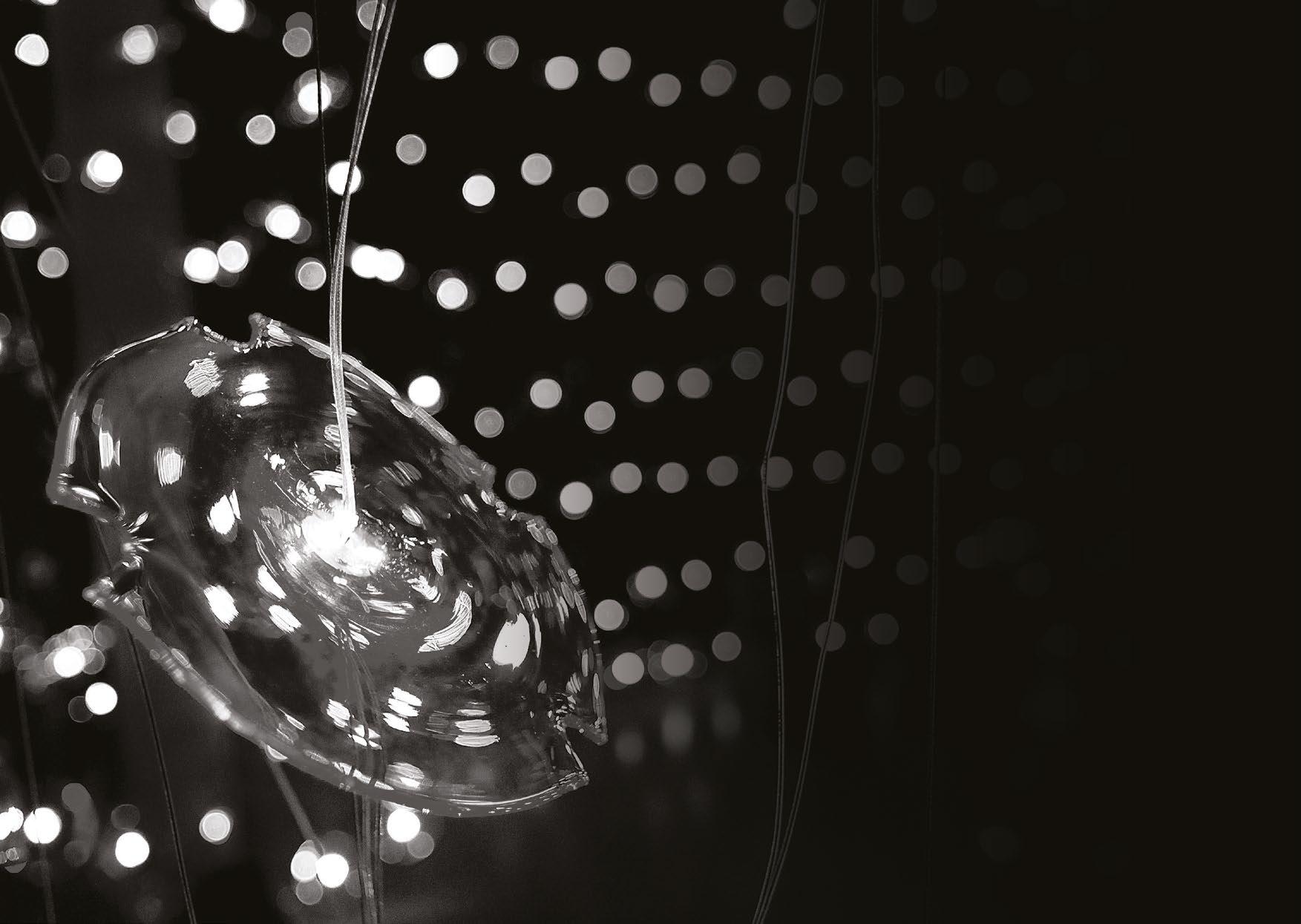
Ci capita spesso, tra una creazione e l’altra, di fermarci, pensare al tempo e restarne affascinati. Perché anche se non si fanno sentire, più di sette secoli di storia si vedono. Questi secoli ci hanno insegnato una cosa in particolare: il modo migliore per tenere in vita una tradizione è viverla.
L’arte è pratica e nessuno
può correre il rischio di mettere un antico mestiere sotto una teca di vetro.
L’arte va fatta, ogni giorno, o non è arte. Mentre lavoriamo, ci sentiamo grati per tutta la conoscenza che questo tempo ha custodito per noi. È il nostro vero capitale.
Da lì ha origine la nostra tensione verso la grazia e la bellezza.
Così come la nostra ossessione per la perfezione è una forma di rispetto per chi ha maneggiato questi strumenti prima di noi. Sono loro lo spirito che vive nelle nostre creazioni - antichi segreti, al servizio di nuove idee. Esperienza che esalta la visione artistica. Eccellenza, sotto una nuova luce.
9 8
Enlightening Uniqueness
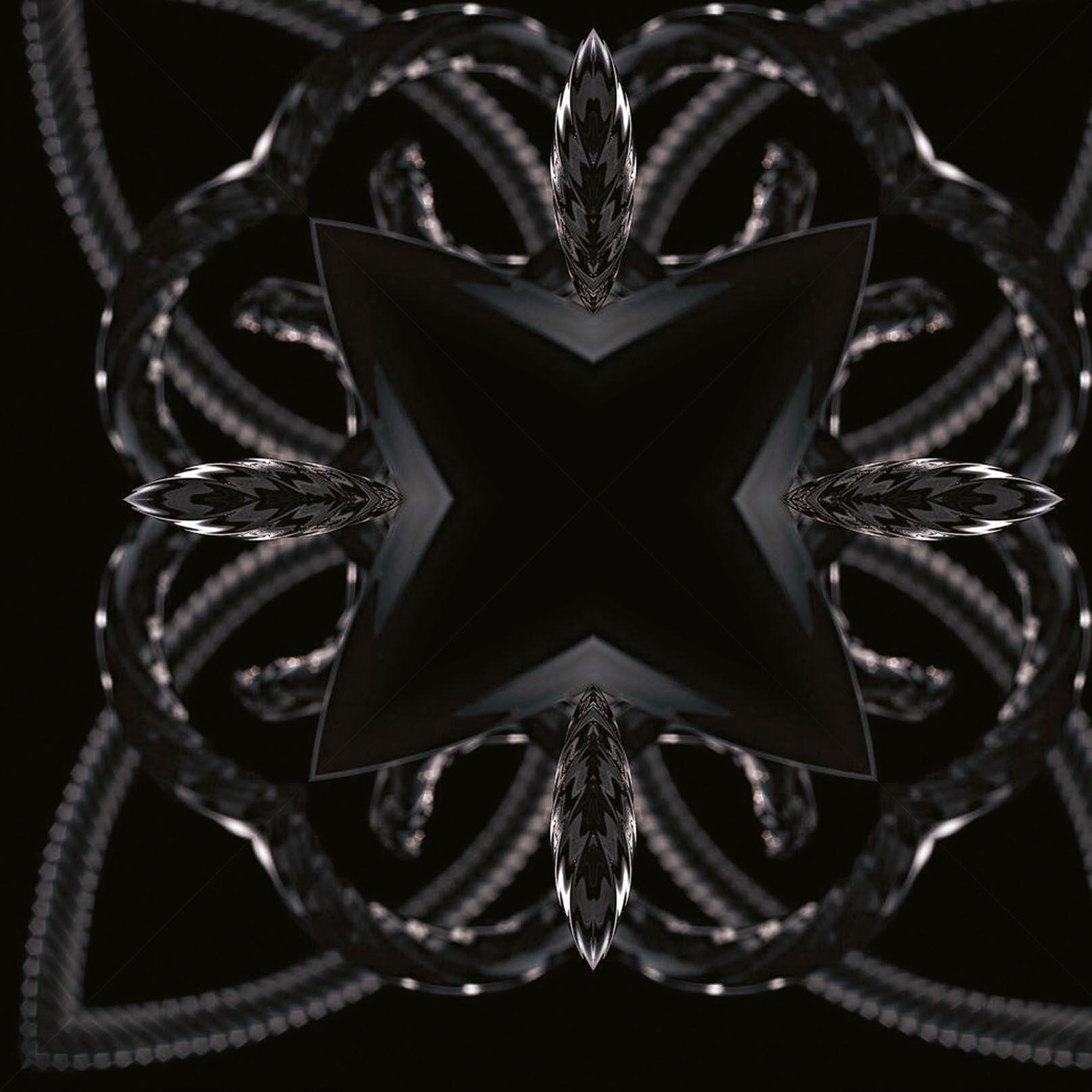
10
In seven centuries of history, we have seen fashions come and go. Some were minimal, others more baroque, but every one of them chased time in a desperate search for the “new.”
Time in Venice, instead, goes by slowly. There is no rush, no craze, just a great deal of space and time to develop your craft.
So we took our time and in that time we have learned that we would rather do something unique and enlightening that lasts forever instead of something new that only fascinates you for one season.
It takes strength to bring glass out from the fire and heat.
It takes patience to strive for nothing less than the perfect shape.
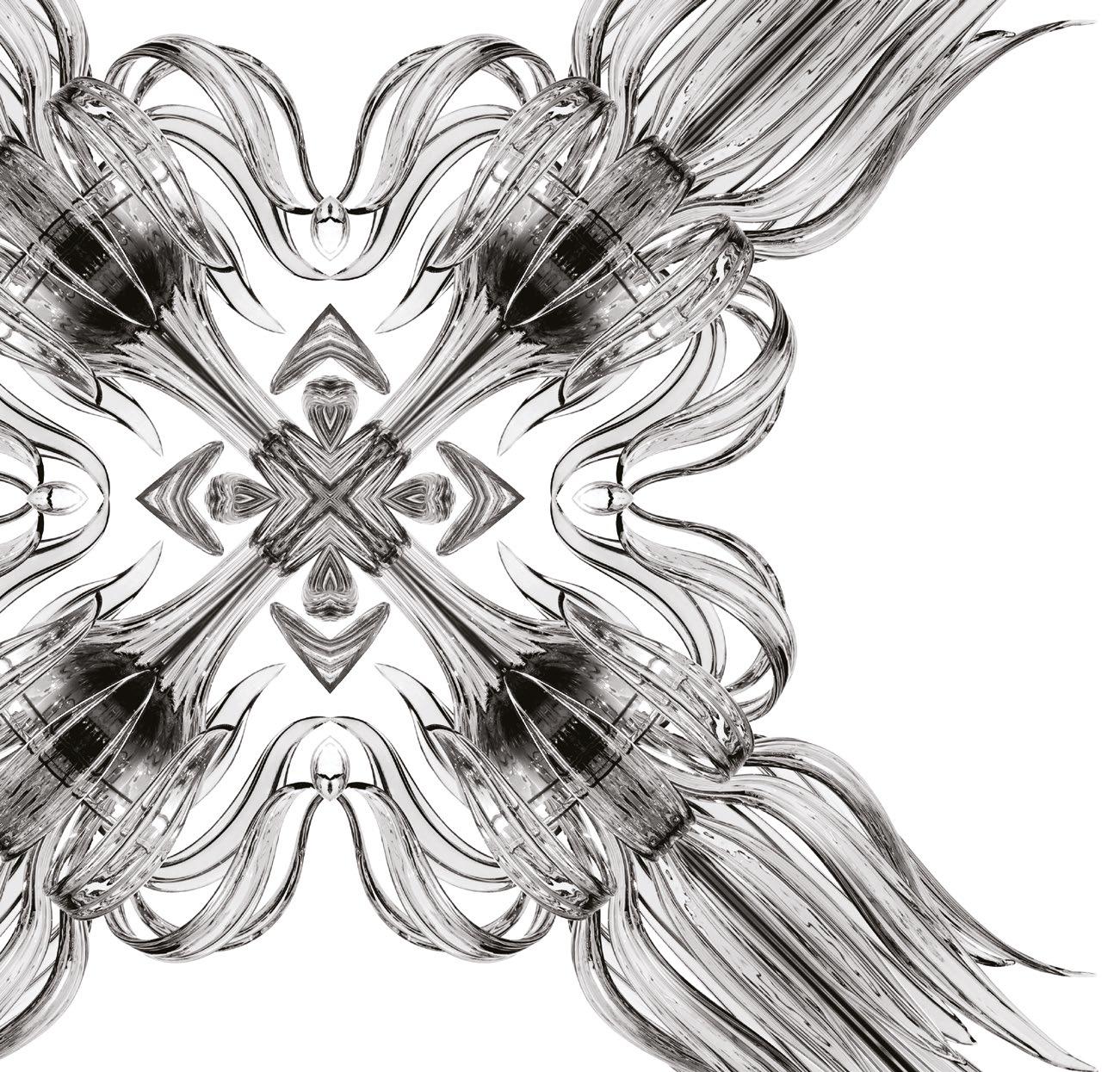
And it takes heart, a lot of it, to grow a legendary luxury lighting tradition into the new world, working with innovators and traditionalists alike.
But again, we can afford the luxury of time. And perhaps, so can you.
In sette secoli di storia abbiamo visto mode andare e venire.
Alcune minimaliste, altre più barocche, ma tutte ugualmente prese ad inseguire il tempo che passa, nella disperata ricerca del “nuovo”.
A Venezia il tempo, invece, scorre lento. Non c’è fretta, solo tempo e spazio necessari per affinare un’arte.
Così, abbiamo deciso di prenderci il nostro tempo, per fare qualcosa di unico e originale. Qualcosa che possa durare per sempre.
Qualcosa che vada oltre il fascino effimero di una stagione.
Ci vuole forza per plasmare il vetro dalla sabbia e dal fuoco.
Ci vuole pazienza per arrivare alla forma perfetta senza compromessi e ci vuole cuore, tanto cuore, per portare una tradizione leggendaria di illuminazione di lusso fino ai giorni nostri,in un perfetto equilibrio tra passato, presente e futuro.
Ma ancora una volta possiamo permetterci il lusso del tempo.
E forse, anche voi.
13
Brand Values
I VALORI DEL BRAND
15 14
02.1
Mastery. Only in Murano

MAESTRIA. SOLO A MURANO
On most days, Venice doesn’t look at all like a painting or a postcard.
She is a beauty veiled by a thick layer of humid mist - the perfect cover for the surrounding islands, where Venice’s artisanal secrets are kept. Murano, the island of glass, is a classic example.
The fragile, perilous secrets of glass making have remained on the island for longer than a thousand years, and fostered the perfect environment for young talents to experiment, learn from their masters, and ultimately emerge on their own.
All in all, the soil makes the plant, and what makes Murano glass so different from any other is Murano itself.
Contrariamente a quanto si pensi, Venezia non sembra sempre un dipinto o un’immagine da cartolina.
Venezia è una bellezza velata, coperta da un manto di nebbia umida che ne nasconde le isole e i loro segreti, specialmente quelli industriali, come il vetro di Murano.
Questi segreti fragili e inconfessabili vivono sull’isola da più di mille anni e hanno creato l’habitat perfetto per far nascere e crescere i giovani talenti dell’arte vetraria.
In fin dei conti, come il terreno fa crescere le piante, ciò che rende il vetro di Murano così diverso e particolare da qualsiasi altro è Murano stessa.
17 16
Angelo Barovier knew this very well, back in the 1400s: he spent all his life on the island, inventing while he was creating, so he could one day lay the foundations of the Barovier dinasty of glassmakers. The Maestro’s works are now in museums, yet every following generation added their own touch to the family tradition, amassing a wealth of knowledge and taste that is still expressed today. And which couldn’t begin or happen anywhere else but in Murano.

Già nel ‘400 Angelo Barovier l’aveva capito. Infatti, passò tutta la vita a Murano, inventando e creando, ma soprattutto consolidando le fondamenta della dinastia Barovier. I lavori del Maestro vivono ormai da tempo nei musei, eppure ogni generazione successiva di Barovier ha aggiunto qualcosa,
apportato un tocco, uno stile, che oggi appartiene a un patrimonio di conoscenze senza pari, espresso in ogni creazione Barovier&Toso. Un patrimonio e una storia che non avrebbero potuto nascere e crescere in nessun altro posto al mondo, se non a Murano.
19
Taif, chandelier. Taif, lampadario. Barovier&Toso,1980
02.2 Heritage. The secrets that made us HERITAGE.
LE OPERE, I SEGRETI
There are many things we won’t be able to tell you about in this book. If we did, we probably wouldn’t even be here now. Every great tradition is paved with little, fundamental secrets that determine - along with fate - who will last through time and who won’t.
To get where we are now, we’ve had to pass our craft down to the next generation of artists for more than seven hundred years. That’s what you call heritage – ancient techniques kept alive through daily implementation and development.
You take an old tradition, mix it with sweat equity, forge it with meaning, and make it last.
Then repeat, for more than 20 generations.
Molte sono le cose che non vi racconteremo in questo libretto.
Non ne abbiatene a male –se avessimo mai raccontato i nostri segreti, sicuramente oggi non saremmo qui.
Infatti, ogni grande tradizione è costellata di piccoli, fondamentali segreti che determinano - assieme al fato - cosa resterà e cosa sparirà nel tempo. Per arrivare fin qui, ci
siamo presi cura di tramandare il nostro mestiere da una generazione all’altra, per più di 700 anni.

E ci siamo fatti un’idea di che cosa significhi la parola heritage.
È un’antica tradizione portata in vita con sudore e duro lavoro; è ricerca di significato e di qualcosa che duri ben più di una singola vita.
Tutto questo, ripetuto per venti generazioni.
21 20
The Barovier family treeLa genealogia della famiglia Barovier
Passion.
Heart and alchemy
The late Ercole Barovier, legendary artistic director of the Barovier Company in the most part of the 20th Century, had a pretty clear picture about how glass can turn into a work of art. And he never settled for anything less.
There are two essential parts in an artistic glass: the artist and the glass master. They may appear to be two expressions of the same essence. Indeed, it is often difficult to distinguish their separate contributions to the final piece. This, however, is not a problem – it’s actually the soul of glass making: technique supporting, interpreting, and enlightening a unique, unbridled artistic vision.
This also means days and weeks spent together at the glassworks, 1200 degrees and above, pinching, cutting, blowing, twisting incandescent material until sand and fire fulfill their destiny and become a creation.


Ercole Barovier thought – and quite rightly so – that there’s something deeply romantic in knowing that all of this could only happen on a remote island in a misty lagoon, where families have recipes for both dishes and glassware, cherished and taught in secret for centuries.
Here, in the silence of the Venetian marshlands, artists and artisans find the right suspension of time and space to play with the laws of nature and create the unthinkable.
Ercole Barovier, storico direttore artistico della Vetreria per gran parte del Novecento, aveva le idee chiare su come trasformare il vetro in opera d’arte. E non si è mai accontentato di niente di meno.
Due sono i creatori principali di un vetro d’arte: l’artista e il maestro vetraio. Se a volte possono sembrare molto simili, nel mondo del vetro in realtà è differente - perché l’arte vetraria è tecnica pura che supporta, interpreta ed esalta una visione artistica unica e libera.
Questo comporta settimane e settimane di lavoro in fornace, a più di 1200 gradi, a plasmare materia incandescente fin quando non diventa un’opera.
Ercole Barovier trovava che ci fosse qualcosa di profondamente romantico nel fatto che tutto questo potesse accadere su un’isola remota di una laguna nebbiosa, dove le famiglie hanno ricette sia per i fornelli che per le fornaci, tramandate in segreto per secoli.
Qui, nel silenzio della laguna veneziana, artisti e maestri vetrai trovano il giusto tempo e spazio per giocare con le leggi della natura e creare l’impensabile.
23
02.3
PASSIONE. CUORE E ALCHIMIA
Work toolsStrumenti di lavoro
Excellence. The path to nobility
ECCELLENZA.
IL PERCORSO VERSO LA NOBILTÀ
The Barovier&Toso logo looks like an aristocratic family crest, and in some way it is. Indeed, nobility can be expressed by a title or, in some rare cases, by a feeling, an allure, an undeniable aura that exudes from the most special and precious things - as were the masterpieces of the Baroviers.
Excellence has always played a major role in the family’s traditions, and their whole story, generation after generation, seems to be guided by an unquenchable thirst for perfection. Throughout the centuries, members of the Barovier family have often chaired the glassmakers guild of Murano or served as judges and revered experts. They surrounded themselves with the finest suppliers of materials and established a philosophy of uncompromising quality that became the framework for each and every one of their luxury lighting icons.
Il logo di Barovier&Toso sembra uno stemma nobiliare, e in un certo senso lo è.
La nobiltà, infatti, si può trovare nei titoli così come nelle creazioni, quando esprimono un più alto valore estetico,
come i capolavori creati dai maestri vetrai. L’eccellenza ha sempre avuto un ruolo centrale nella tradizione di casa Barovier. Membri della famiglia hanno rivestito cariche importanti nella corporazione
dei vetrai di Murano in tutti i secoli. Attorno a loro gravitarono i migliori fornitori di sempre, tutti alla ricerca del lusso senza compromessi: eccellenza allo stato puro espressa in lampadari sempre più sorprendenti.
Taif, chandelier. Taif, lampadario. Barovier&Toso,1980
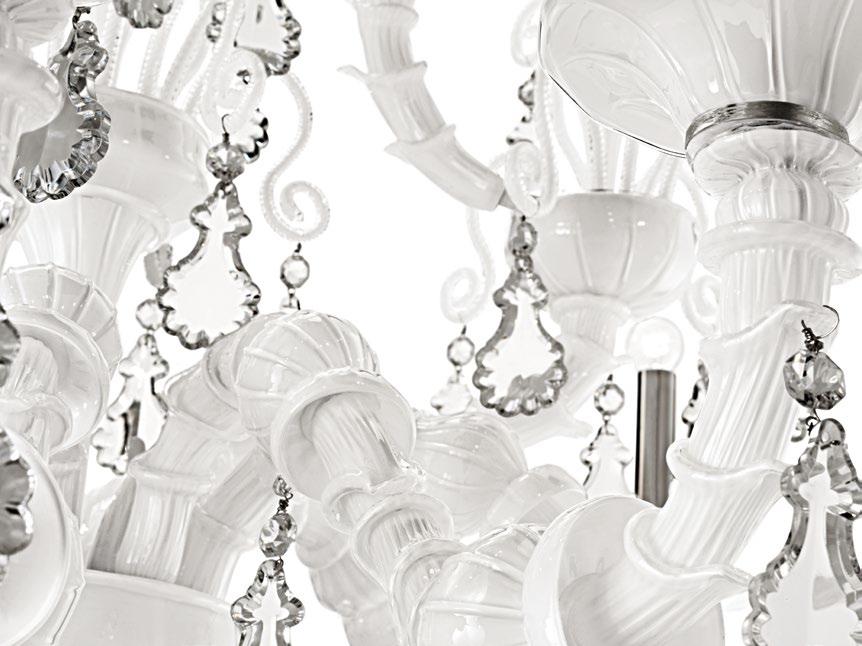
Finally, around the middle of the 20th Century, the Barovier glassworks joined forces with the SAIAR Ferro Toso factory. Two complementary companies melding their specific expertise in the field of illumination and artistic objects in a single industrial project.
Intorno alla metà del Ventesimo secolo, i Barovier decisero di unire la propria avventura imprenditoriale a quella della SAIAR Ferro Toso: due aziende complementari mettono al servizio di un unico progetto le proprie competenze specifiche nel campo dell’illuminazione e dell’oggettistica d’arte.
25 24
02.4
Through Time ATTRAVERSO IL TEMPO
27 26
Renaissance men
Part of our story already belongs to History. You can find it hidden in the details of paintings by Tintoretto, Giorgione, Caravaggio, or Tiziano. The works of Angelo Barovier “the Elder” and his close descendants have been preserved like pieces of a legend, and can now be enjoyed in Museums across the world. Three of them, above all others, are considered to be the greatest glass masterpieces ever produced: the cup of birds, the light blue crystal chalice and the wedding cup.
Angelo was a true Renaissance man, a curious gentleman of the 1400s, who brought his love for art and the sciences into his glass making practice. This led him to ground-breaking achievements, as was his cristallino glass, a matter so pure, transparent, and unique that granted him the exclusive patent of the Republic of Venice and propelled his reputation in the glass
industry to the same levels of Michelangelo and Leonardo.
Many of the secrets of the Barovier family were discovered throughout the most exciting Centuries of the Italian Renaissance
Barovier Wedding Cup, made by blue glass with colored decorations, traditionally attributed to Angelo Barovier (c. 1445, Murano Glass Museum)
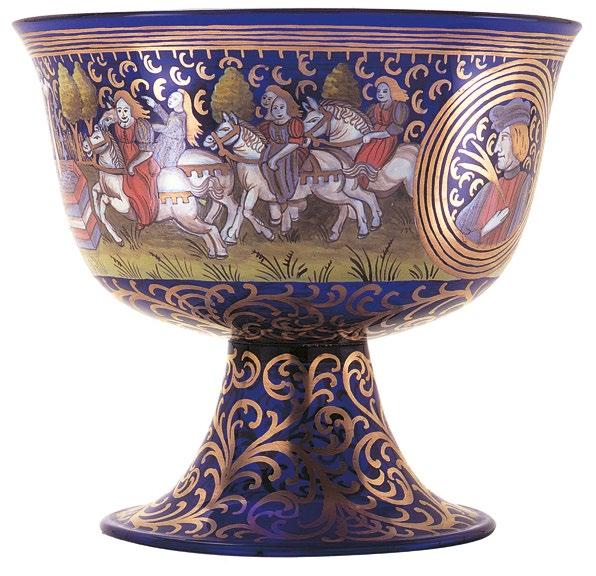
-
Coppa nuziale, nota come “Coppa Barovier” in vetro blu con decorazioni policrome, per tradizione attribuita ad Angelo Barovier. (1445 circa, Museo del Vetro di Murano)
Parte della nostra storia è già Storia. La si può ritrovare nascosta nei dipinti di Tintoretto, Giorgione, Caravaggio o Tiziano.
I lavori di Angelo Barovier detto “il Vecchio” e i suoi diretti discendenti sono custoditi come opere d’inestimabile valore nei musei di tutto il mondo. Tre di esse, in particolare, sono ormai considerati come i più grandi capolavori in vetro esistenti: la coppa degli uccelli, il calice in vetro azzurro e la coppa nuziale. Angelo era un vero uomo del Rinascimento, mosso soltanto dalla sua inesauribile curiosità e ispirato nella sua pratica artistica da tutte le nozioni di scienza e alchimia che nel frattempo approfondiva. Proprio questa contaminazione gli permise di giungere al vetro cristallino, il vetro
più trasparente e leggero dell’epoca, talmente unico che la Serenissima gliene diede privilegio, o come diremmo oggi, brevetto esclusivo.
Al culmine della sua carriera, Angelo Barovier era già per il vetro ciò che Michelangelo e Leonardo furono per la pittura. Molti dei segreti che oggi guidano l’attività di Barovier&Toso furono scoperti nei secoli d’oro dell’arte italiana, dal ‘400 al ‘600. Fu una congiuntura particolarmente unica e favorevole: sei generazioni consecutive di artisti, l’una intenta a insegnare all’altra un’arte che di anno in anno cresceva esponenzialmente, aumentando la varietà stilistica e la capacità produttiva della vetreria di famiglia. Un riferimento per il mondo del vetro e un’ispirazione per tutte le arti e le scienze del tempo.
29 28
03.1
FIGLI DEL RINASCIMENTO
– six subsequent generations of extremely gifted artists, sharing knowledge with one another, and inspiring the broader art and science community of their times.
03.2
Centuries and Masterpieces
CAPOLAVORI NEI SECOLI
Through time, the Barovier collection of masterpieces got larger and larger, as did the dynasty.
At the turn of the Century between Renaissance and Baroque (1500s going into 1600s) there were three Barovier glass masters in Murano, each of them running independent glassworks: the “Angel”, the “Bell” and the “Star”. These insignias, especially the Angel, would reappear at crucial times throughout the following three Centuries – the most tumultuous years Venice, and Murano, ever lived.
The Baroque challenged the family in multiple ways. First of all, the extremely refined and pompous style of the time pushed artists to experiment and dare like never before. Additionally, several glass making districts popped up in the rest of Europe, as in Bohemia or England.
The 18th Century was marked by the fall of the millenary Venetian Republic, ending in decades of chaos and oppression that the Baroviers, however, managed to withstand while protecting their glass making secrets – and those of the glassmakers who didn’t manage to keep their art alive.
Con il passare del tempo, la collezione di capolavori Barovier crebbe notevolmente. Tra il Rinascimento e il Barocco, a Murano si potevano incontrare ben tre vetrerie dei Barovier, sotto differenti stemmi: l’angelo, la campana e la stella.
Queste insegne, e specialmente l’angelo, ritorneranno nei tre secoli seguenti, i più tumultuosi nella storia di Venezia.
Il Barocco è stato una sfida per i Barovier. Innanzitutto, lo stile ampolloso e ridondante
The Barovier crest: three sixteenth-century craft sings

Lo stemma Barovier: tre insegne di bottega del XVI secolo
del tempo li sfidò sia esteticamente che tecnicamente. Inoltre, in tutta Europa iniziavano a fiorire altri centri di produzione di vetro, come Inghilterra e Boemia.
Alla fine del XVIII secolo la Repubblica di Venezia fu conquistata da Napoleone e ceduta all’Austria, e da lì iniziò un lungo periodo di declino, caos e oppressione durante il quale i Barovier riuscirono, nonostante tutto, a sopravvivere e proteggere la loro arte, in vista di lontanissimi tempi migliori.
31 30
A vase in “primavera” glass, one of a renowned series made in 1929 (from the collection Jacopo Barovier)
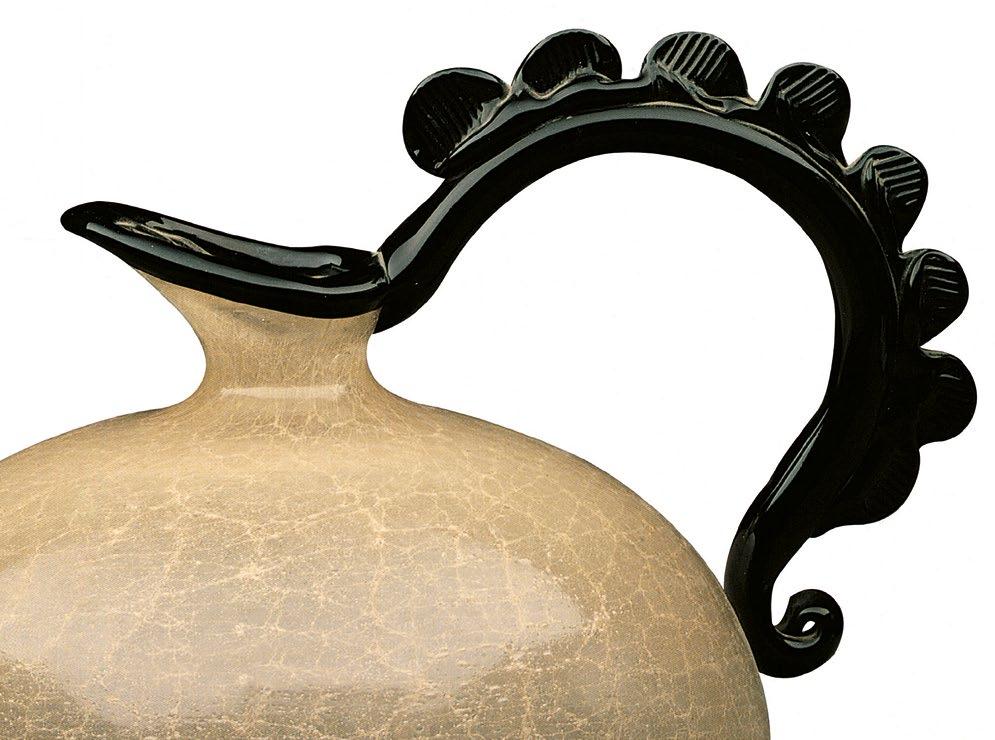
Anfora in vetro “primavera” appartenente a una celebre serie del 1929 (collezione Jacopo Barovier)
Around the mid-1800s the world finally started to change. The craft of the Baroviers was still alive, hailing from the new “Angel” glassworks run by another Angelo Barovier. The innovative Salviati glassworks, his main competitor back then, hired his three sons, and after 10 years they left and laid the foundations of the new Barovier – the “Artisti Barovier” company, under the crest of the Star, the Angel, and the Bell.
Most importantly, the Baroviers opened the doors of their ateliers to sculptors, painters, designers, and architects, and began a tradition of collaboration that defines the House’s style as of today.
Verso la seconda metà dell’Ottocento, il mondo finalmente iniziò a cambiare. Dalla fucina dell’Angelo, i Barovier continuavano la loro produzione mentre mandavano a studiare i propri discendenti presso la nuova e formidabile vetreria Salviati. Ben presto, però, i tre giovani Barovier lasciarono la Salviati per costituirsi nella nuova “Artisti Barovier”, il cui stemma recava - e reca ancora - la stella, la campana e, appunto, l’angelo. Da lì iniziò un nuovo corso per la dinastia - una corsa inarrestabile lungo tutte le nuove tendenze europee, alla ricerca
di uno stile unico e personale che potesse unire la tradizione veneziana e la ricerca internazionale.
Gli anni tra il 1880 ed il 1920 furono anni di vero e proprio eroismo creativo, in cui la cifra stilistica Barovier riuscì ad evolvere nonostante guerre e distruzione.
Questo accadde anche grazie a tutti gli artisti, designer, scultori e pittori che collaborarono alle creazioni. Aprire le porte della vetreria fu di certo un’intuizione geniale, che oggi è ormai divenuta tradizione e prassi.
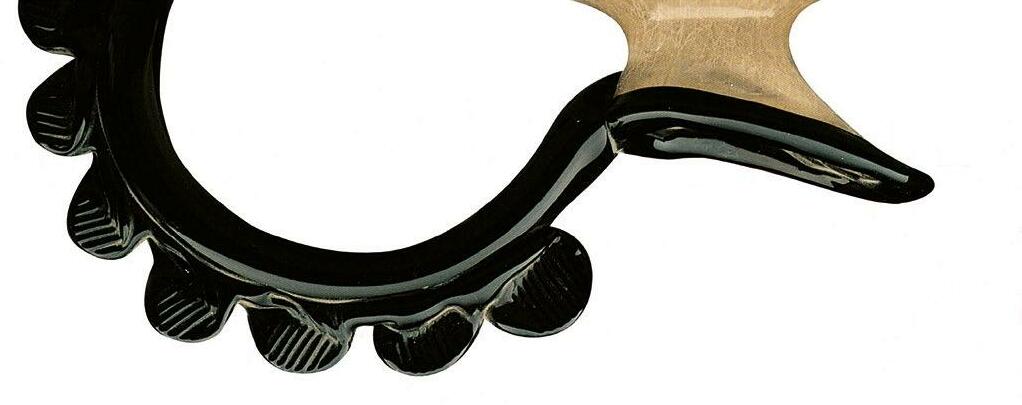
33 32
Catching up with the European trends and discoveries in glass making was exciting
and exhausting, thus every piece from between 1880 and 1920 should rightly be regarded as an act of heroic artistry.
New Life
LA RINASCITA
Towards the end of the 19th Century, times were finally ready for a Barovier renaissance. It came in the guise of young Ercole Barovier, a studious and entrepreneurial son of the Novecento, who took the reins of the glassworks shortly after its post-World War I re-establishment, naming it “Vetreria Artistica Barovier&C”. It had been quite a while since the factory was run by a designer, with an artistic vision to match that of artists more famous than himself, and a taste for research and contemporary discourse
that involved and energized the entire family and community.
Ercole Barovier made no compromise.
In 1936 he purchased the sole ownership of the glassworks and joined forces with the SAIAR Ferro Toso, while his works were traveling the world from one exhibition to another, inspiring awe at all latitudes.
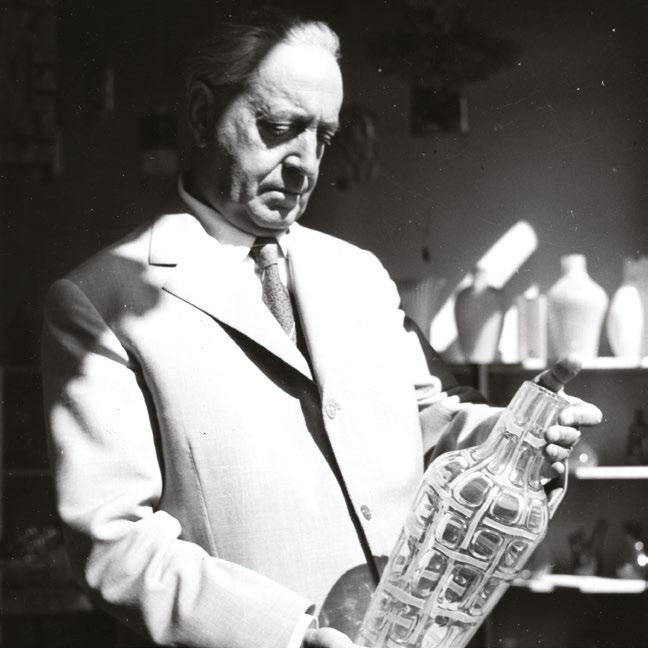
His vision was so strong and clear it guided both his son Angelo (1927-2008) and grandson Jacopo, who helmed the Company until 2016.
Alla fine del XIX secolo, i Barovier erano pronti per la tanto attesa rinascita. Arrivò nella figura di Ercole Barovier (1889-1974), un vero uomo del Novecento: studioso, intraprendente, dotato di un gusto raffinato e capace di lavorare con tutti i migliori artisti e collaboratori del tempo.
Subito dopo la Grande Guerra, Ercole stabilì la rinata “Vetreria Artistica Barovier&C” proprio a Murano, l’isola che i Barovier dovettero abbandonare per alcuni anni durante le ostilità.
Avere nuovamente un designer a capo della fabbrica fu fondamentale.
La visione artistica di Ercole Barovier non era seconda a nessuno degli artisti e designer
che gravitavano intorno alla vetreria. Il suo gusto era estremamente contemporaneo, e fu d’ispirazione per tutta la comunità artistica del tempo. Ma soprattutto, Ercole Barovier non scese mai a compromessi.
Nel 1936 acquisì la proprietà unica dell’azienda e la fuse con la SAIAR Ferro Toso, con cui collaborava già da tempo, mentre le sue opere viaggiavano per il mondo da una mostra all’altra, a tutte le latitudini.
La stessa visione di Ercole guidò suo figlio Angelo (1927-2008) nella seconda metà del Novecento, così come il nipote Jacopo, che guidò l’azienda fino al 2016.
03.3
35 34
Ercole Barovier
The amount of drawings, prototypes, models, and creations produced in seven hundred years of History cannot possibly be told in a paragraph. But, just to give you an idea, it fills an entire building in Murano.
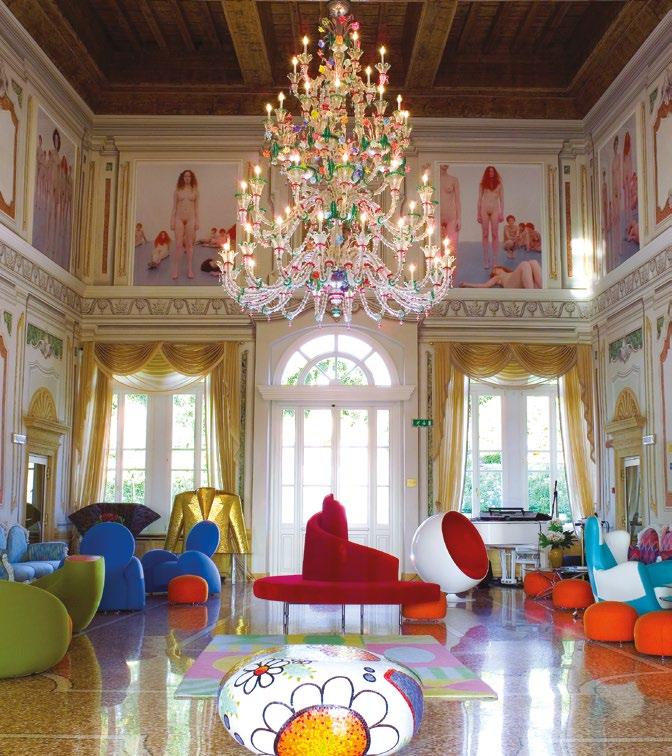
This collection of timeless creations is a treasure we can always go back to when we look for inspiration for the new, contemporary challenges artists and designers bring to us.
However, we know very well that the greatest icons escape the walls of museums – they belong to the public eye and knowledge, therefore we regularly engage in public art initiatives.
Luxury, too, has changed a lot throughout centuries. At times it looked voluptuous, and then suddenly became rigid and minimal. Luxury proved it can be many things – ironic and provocative, harmonious and unreachable, you name it. Personally, we like luxury when it’s beautiful. Therefore, looking at the future, we can say one thing for sure:
È semplicemente impossibile raccontare qui l’enorme quantità di disegni, prototipi, modelli e creazioni prodotti in sette secoli di storia. Questa collezione è per noi un patrimonio inesauribile d’ispirazione ogni volta che artisti e designer ci sottopongono le loro nuove sfide. Sappiamo però che le icone più memorabili trascendono le mura dei musei ed entrano nella vita di tutte le persone - per questo siamo spesso coinvolti in iniziative di arte pubblica.
In questi secoli anche il lusso è mutato molte volte. Si è fatto prima sinuoso, poi rigido e minimale, ironico e provocatorio o armonioso e inarrivabile. Ma sempre e comunque innegabilmente bello. Perché nulla tocca l’animo umano come la bellezza. Perciò, pensando al domani possiamo dirvi questo: qualunque forma il lusso prenderà nel futuro, noi la esalteremo con la luce e bellezza delle nostre creazioni.
37 36
03.4
no matter what shape luxury will take, our creations will be there to cast a light on its beauty.
Here, now and tomorrow
OGGI E DOMANI
Byblos Art Hotel Villa Amistà Verona.
The light of time
LA LUCE DEL TEMPO
We wanted to honor our unbreakable bond with Murano.
We wanted the glass to express its full potential, creating bursts of wonder in the eyes of the beholder.
The desire to create the unthinkable: a space that tells our story and encloses the essence of our art. It led us to the careful selection of this place, a historic palace on the shores of Rio dei Vetrai, which for centuries have hosted the most renowned furnaces of the world.
We breathed a new life into an ancient industrial building, guided by the remarkable skills of the architecture studio Calvi Brambilla.
Barovier&Toso Palace, Murano
Palazzo Barovier&Toso, Murano

Volevamo onorare il nostro legame indissolubile con Murano. Volevamo che il vetro potesse esprimere il massimo del proprio potenziale e far nascere la meraviglia negli occhi di chi guarda.
Per questo, abbiamo ideato uno spazio che racconta la nostra storia e racchiude l’essenza della nostra arte. La scelta non è ricaduta su un luogo qualunque: uno storico palazzo sulle rive di Rio dei Vetrai, che da secoli accolgono le fornaci più famose al mondo. Abbiamo dato nuova vita a un antico edificio industriale, trasformandolo in chiave contemporanea grazie al sapiente lavoro
dello studio di architettura Calvi Brambilla. Palazzo Barovier&Toso è oggi un tempio che celebra la luce in tutte le sue sfumature e rifrazioni, attraverso le nostre migliori collezioni. Un elogio alla lentezza e alla cura del lavoro artigianale, che plasma milioni di granelli di sabbia in forme di vetro uniche e irripetibili.
Uno spazio accogliente ed elegante, per trasmettere e condividere la passione che da settecento anni caratterizza l’attività dei nostri maestri vetrai nel creare collezioni eterne.
Un luogo in cui il tempo è sospeso e lo sguardo può concedersi il lusso di contemplare.
39 38 03.5
Today, Palazzo Barovier&Toso is a temple that celebrates light in all its nuances and refractions, through our finest collections.

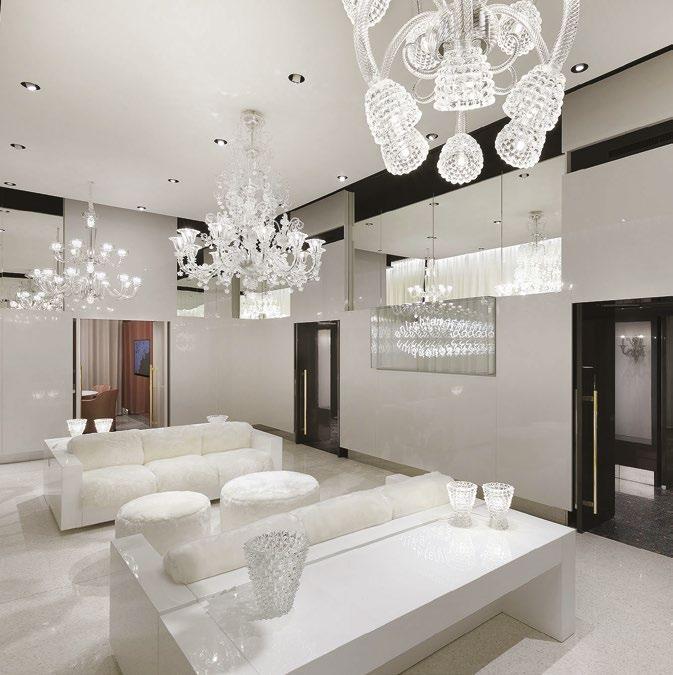
41 40
Palazzo Barovier&Toso, MuranoBarovier&Toso Palace, Murano
Icon - Taif
L’ICONA - TAIF
43 42
One of Barovier&Toso’s greatest challenges came in 1980, when a French design studio asked for a chandelier to be placed in King Al-Saud’s new palace in Taif.
Una delle sfide più grandi giunse nel 1980, quando Re al-Saud stava costruendo la sua nuova residenza di Taif e richiese l’intervento di uno studio francese, che subito si rivolse a Barovier&Toso.

44
04.1 The essential made visible L’ESSENZIALE VISIBILE AGLI OCCHI
Mixing French and Venetian taste is no easy task at all, so the first thing Barovier&Toso had to do was “purifying” Murano glass – bring it down to the essential, to then elevate it in a new style.
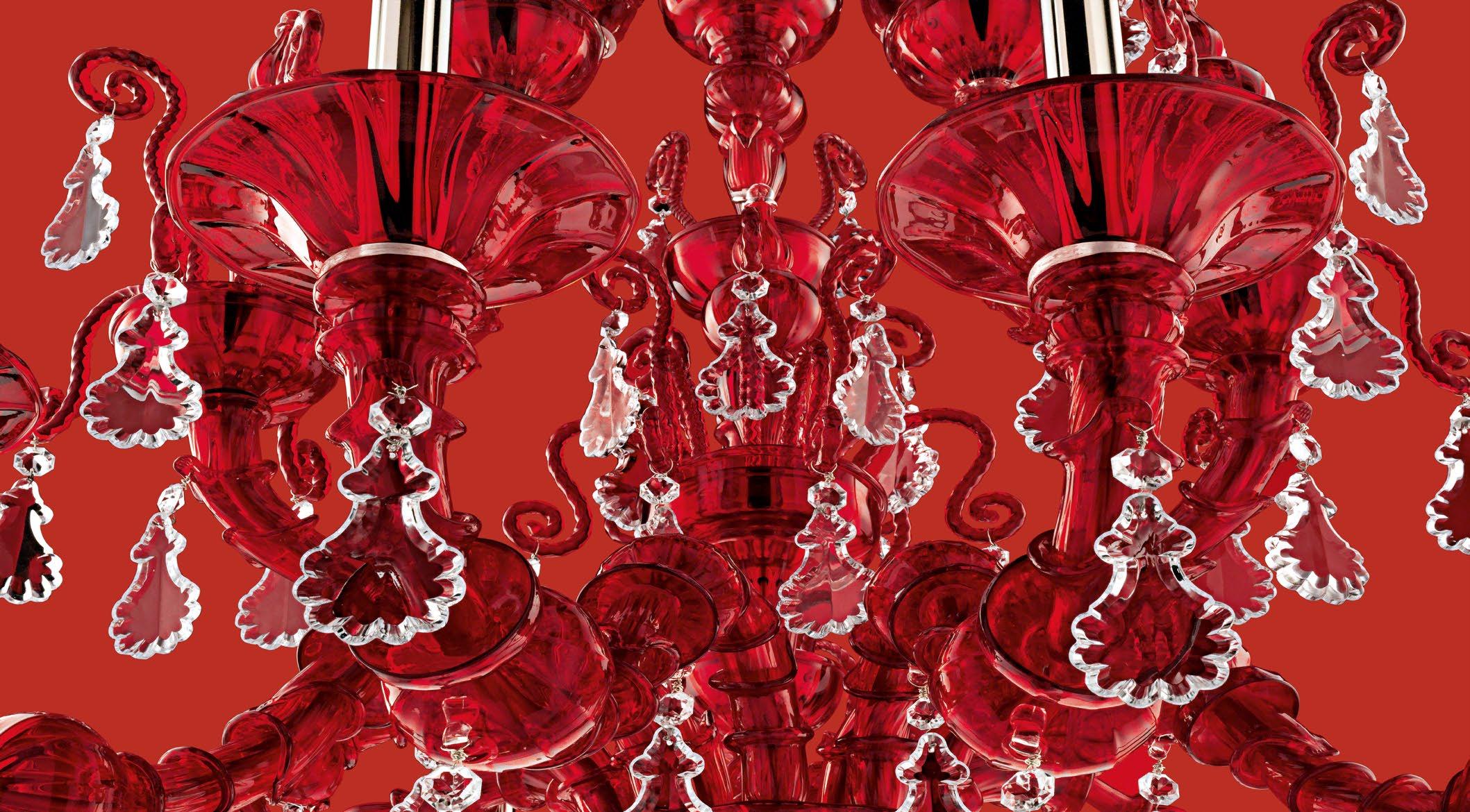
This chandelier opened up new perspectives of Classic: it preserved all the formal quality and value of Murano glass, while fluently speaking new aesthetic languages and mixing with ever-evolving styles and trends.
After endless subtractions and replacements, a line began to take shape around the curvy arms of the chandelier, with an unusual monochrome color that became the canvas for all bohemian and French additions.
The Venetian mark, thus, left the stage front to become the architecture of a stunning play of crosses, drops, and candles made of steel that create a unique refraction of light. The Taif was born, and it soon grew into dramatic, iconic new versions, such as the ultra dark Taif of Seoul’s Hyatt Hotel – the first time a Venetian artwork ever went all black.
This versatility and vision made Taif a new standard in the Barovier&Toso collection and represents their timeless pursuit of perfection.
Taif, chandelier.
Design: Barovier&Toso, 1980.
Taif, lampadario. Barovier&Toso, 1980.
Mescolare il gusto francese e quello veneziano non fu per niente facile.Innanzitutto, richiese una “pulizia” iniziale - portare il vetro di Murano alla sua presenza più essenziale, per poi elevarlo nuovamente in uno stile originale. Dopo infinite addizioni e sottrazioni, una linea iniziò a prender forma, dai bracci ricurvi del lampadario. Il colore era un monocromo molto inusuale, che divenne subito la base su cui inserire
47 46
Barovier&Toso srl
Fondamenta Vetrai 28 - 30141 Murano Venezia Italy T (+39) 041739049 barovier.com






















